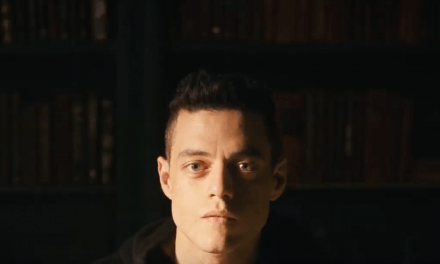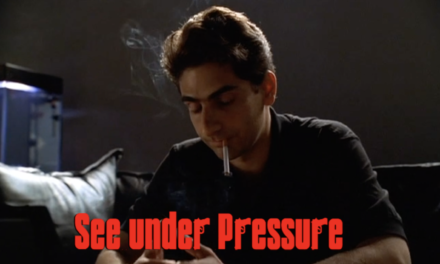
When thinking about TV in relation to horror/SF/fantasy I tend to think in quite simple terms. Its modern incarnation starts with the arrival of Twin Peaks in 1990. There’s not much more than needs to be said about Twin Peaks, and I’m sure the forthcoming book on the series edited by Catherine Spooner and Jeffrey Weinstock will say it better than I, so let’s just say it broke moulds with its surreal and highly cinematic mise en scene, its quirky characters, its cult status and its arc narrative. Twin Peaks of course was cancelled after a second season which, although ripe for reassessment, sags undeniably in the middle as the narrative shifts from ‘who killed Laura Palmer?’ to the slightly less compelling ‘Will Lucy stay with Andy or go for Dick? ‘(pun intended) or ‘Will James EVER stop being quite so unfathomably wet?’.
The ball was picked up by The X-Files (1993-2002), which had five or six good years to influence shows like Buffy (1997-2003), Angel (1999-2003), Fringe (2008-2013), Supernatural (2005-) and more recently Sleepy Hollow, the cream of the crop of new series in 2013. So the family tree begins with Twin Peaks, which spawns The X-Files, which spawns more or less everything that follows, although they of course influence each other as well. As I say, it’s overly simplistic and I know that, but it will do for the purposes of introduction to what I wish to talk about, which is a rather curious missing link in this particular chain.
For a forthcoming project I am undertaking what I am calling ‘The Great Stephen King Rewatch’, (it has capital letters in my mind) viewing every King work written or adapted for film and TV, good, bad and indifferent. The scientific approach to the order in which I am doing this (that goes something like “oooh, I fancy watching that tonight”) brought me to Stephen King’s Golden Years (1991), which I had never seen, for the main reason that I’d never heard any good things about it and had no idea who was in it. I was pleasantly surprised, and then intrigued.
)
Stephen King’s Golden Years falls between Twin Peaks and The X-Files. It aired on CBS over seven weeks in July-August 1991. It was very much a King project. He conceived it, wrote the first five episodes and the outline for the last two. It tells the story of Harlan Williams (Keith Szarabajka, or Holtz from Angel as he is better known) a man in his 70s, who works as a janitor in a top secret Government lab. Harlan is a typical Steve King hero, an ordinary blue-collar guy suddenly faced with the extraordinary and inexplicable. During the course of an experiment undertaken by obviously mad scientist Dr Todhunter (Bill Raymond) he is exposed to something which causes his cells to regenerate and begins to reverse the aging process, to the consternation of his wife, Gina (Frances Sternhagen). Once word gets out he is pursued by Jude Andrews (R.D. Call), an assassin and operative for the shady government organisation known as The Shop, and protected by former Shop agent turned Chief of Security Terry, played by Felicity Huffman. Typical of King’s oeuvre, the story references previous works. The idea of reversing a physical state was explored in his 1984 novel Thinner (pseudonymously published as a Richard Bachman book) in which morbidly obese Billy Halleck is cursed by a gypsy to lose weight. Most influential however is his 1980 novel Firestarter, which again features a protagonist with extraordinary powers pursued by The Shop. In Firestarter the gifted target is a young girl, Charlie McGee, who has the ability to create and control fire, and her pursuer is John Rainbird, a frankly rather problematic native American character played in the 1984 film version by George C. Scott, and name-checked in Golden Years.
The show was originally designed with a possible second series in mind, but CBS cancelled it after the run of the first seven episodes. Episode seven ended on a downbeat, ambiguous note and so the ending was redone and the episodes re-edited so that what is now available is packaged as a complete four hour mini-series. This could go some way to explaining its rather poor reputation. The breaks between episodes have been removed so there is no sense of the ebb and flow of the story as it builds to the climax of each one, while the reworked ending is disappointing to say the least. Harlan completely out of the blue manages to control his power of regeneration to make he and his wife disappear, while super-agent Terry and her boss General Cruze (Ed Lauter) skip off into the sunset together. It doesn’t round up the story satisfactorily and makes absolutely no sense, and it is now a rather curious historical artefact for a number of reasons.
The first is that someone felt it necessary to go back in and redo the ending to finish the story for home video release, however ham-fistedly, rather than simply letting it stand as it was. Perhaps, being a more or less pre-internet show, it was less likely that someone could easily find out that what they had bought was cancelled, and so just ends without neatly tying up loose ends. It is interesting now that a series like Invasion (2005) for example, cancelled at the end of its first season so that there was no chance to wind it up, nevertheless has a continued life on DVD despite the cliffhanger ending, mainly I think because the awareness of the end of a series is more widespread than it was in 1991. Certainly the information is more accessible. But more than that the re-edit says something about the perception of Stephen King’s work on TV. Golden Years aired 9 months after It, the first of ABC’s mini-series adaptations of King’s work and was followed by The Tommyknockers (1993) and then, subsequently, The Stand (1994), The Shining (1997), Storm of the Century (1999), Rose Red(2002), Kingdom Hospital (2004), Salem’s Lot (2004), Desperation (2006) and Bag of Bones (2011). Long before The Dead Zone (2002-2007), Haven (2010-) and Under the Dome (2013-) managed to craft a long-running series from King’s work, this failed attempt was re-edited and repackaged as a mini-series, as if that was the only thing that King on TV could be.
And make no mistake, it is most definitely a failed attempt, not just because it was cancelled but also because this was King trying to do his own Twin Peaks. In an interview before the broadcast, he openly acknowledges that it was Twin Peaks that got the project started, suggesting that, ‘up until Twin Peaks came on the only sort of continuing drama that TV understood was soap opera, Dallas, Knots Landing, that sort of thing.’ But while King is undoubtedly an authority on writing novels, and is clearly very good at it, his judgment when it comes to adaptation is less certain. He is, fundamentally, interested in the tale to be told with the result that, as in the case of his own version of The Shining (1997), while the beats of the story are all there, what’s missing is any real sense of atmosphere or menace. The concept may be scary, and indeed it may be scary as King writes it, but in the audio-visual medium of TV scary is more than that. As Tasha Robinson points out in a very perceptive piece, ‘because King’s words live onscreen more accurately in his version, doesn’t mean they breathe onscreen…where the TV miniseries follows the book it has a thudding, overexplained literalism’.
In his books King’s stories, characters and dialogue exist alongside a surefooted, often very funny descriptive prose which brings these elements to life within a coherent world but which also, crucially, generates the mood of the piece. On TV that prose is absent, which is where the importance of televisual style comes in, not just in terms of the mise en scene, but also in terms of understanding the construction of a piece of television, especially in the case of serial drama. It was the style created by David Lynch that held Twin Peaks together and bound the quirks of the characters to the world they inhabited, but an experienced TV person in the shape of Mark Frost guided this over the series. By contrast Golden Years has just King and his long-time producing partner Richard P. Rubinstein giving it a literary voice but not a televisual authorial hand. Golden Years effectively illustrates a Stephen King narrative in a flat visual style that serves rather than presents the story, reminding us that writing alone is not nearly enough. What you need to go with it is a televisual imagination.
)
Which is exactly what has happened with Haven and Under the Dome. Both adapt a King novel into a serial drama, but both depart from King’s own source material to allow the narrative to adapt to the necessary beats that serial drama requires. For example, in King’s novel of Under the Dome town selectman and used car dealer Big Jim Rennie is, to all intents and purposes, dangerous from the get go, while his son, Junior, murders his girlfriend Angie in his first appearance. Both characters are given more complexity in the series. It takes almost the entirety of season one for Big Jim (Dean Norris) to become truly megalomaniacal, while Junior (Alexander Koch) holds Angie (Britt Robertson) captive rather than strangling her on the kitchen floor, allowing his character to vacillate ambiguously between good and evil through the season. An original screenplay, Golden Years is, fundamentally, a King novel stripped of his eloquent prose leaving only the plot, characters and dialogue, while Under the Dome is something greater than King’s original work. Not better necessarily, but greater in the sense that it is both his and not-his, transformed to fit serial TV by an experienced TV writer in the form of Brian K Vaughan, who has written for Lost, a similar tale in which a group of people are isolated by a mysterious force.
As I begin to think through King’s work as adapted to film and TV, it is becoming increasingly clear that the most effective translations from page to screen involve a meeting of creative minds. Think of King and Rob Reiner (Stand by Me, 1986, Misery, 1990), King and Frank Darabont (The Shawshank Redemption, 1994, The Green Mile, 1999, The Mist, 2007), King and David Cronenberg (The Dead Zone, 1983), King and Brian De Palma (Carrie, 1976). These films are collaborations, in essence if not in fact, in which both author and director bring something to the project, creating films that capture the spirit of King’s story and writing and translates it into an effective audio-visual representation. Despite a very auspicious start with Tobe Hooper’s Salem’s Lot (1979), TV adaptations have traditionally been seen as less successful in this regard, often presenting a rather flat aesthetic as visual style is set aside in favour of an emphasis on King’s narrative. The TV mini-series of The Shining is a good example, as are The Tommyknockers, Desperation and Golden Years. But things seem to be moving in a new direction as Haven and Under the Dome start to offer similar kinds of collaborative practice, creating something which is both King and more-than-King, with the author working in service of a television product, rather than the other way round.
Perhaps inspired by the success of these shows, adaptations of King’s work are cropping up again as viable projects. Tod Williams is directing King’s zombie novel Cell, reuniting John Cusack and Samuel L. Jackson (from 1408, 2007) in the process, while Cusack is rumoured to be interested in both adapting and starring in Doctor Sleep, playing the adult Danny Torrance in King’s sequel to The Shining. And at the back of all this, in development hell, is the mouthwatering prospect of The Dark Tower, King’s epic fantasy series which, rumour has it, might feature Breaking Bad’s Aaron Paul as Eddie Dean; pretty much perfect casting. As far as it stands at the moment, The Dark Tower will be three movies plus a television element, at one point linked to HBO, and with Under the Dome and Haven still going strong, perhaps the Golden Years of Stephen King on the small screen still lie ahead. This probably explains why he’s having so much fun.
Simon Brown is Director of Studies for Film, TV and Media and Cultural Studies at Kingston University. His main research areas are early cinema, British cinema and contemporary American television, and he has published pieces on shows as diverse as Dexter, Alias, Supernatural and The X-Files.





